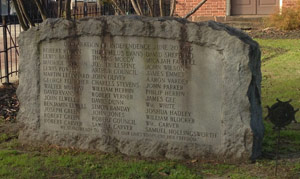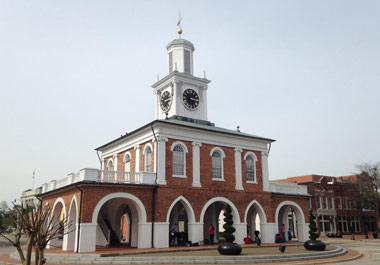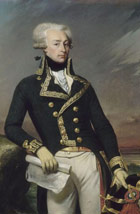
History
The Liberty Point Resolves, also known as “The Cumberland Association,” was a resolution signed by fifty residents of Cumberland County, North Carolina, early in the American Revolution.

Liberty Point Resolves
Just one block east of the Market House is
Liberty Point. It was at this site on June 20th,
1775, that fifty patriots signed a document
of freedom known as the Liberty Point Resolves,
also known as “The Cumberland Association.”
A boulder at Liberty Point lists the fifty-five
names of the men who gave their pledges to
to secure the colony’s freedom and safety.
Photo by Janelle Sanchez
On June 20, 1775, these patriots, who had formed themselves into a group known simply as “The Association,” met at Lewis Barge’s tavern in Cross Creek (now part of Fayetteville) to sign a document protesting the actions of Great Britain following the battles of Lexington and Concord. The signers expressed the hope that Great Britain and the colonies would be reconciled, but vowed that, if necessary, they would “go forth and be ready to sacrifice our lives and fortunes to secure her freedom and safety.” The resolves were thus not a declaration of independence since public advocation for separation from Great Britain would not become common until 1776.
The period of the American Revolution was a time of divided loyalties in Cumberland County, and a considerable portion of the population, especially the Highland Scots who had immigrated in 1739, were staunchly loyal to the British Crown. Among them was the famous Scottish heroine Flora MacDonald. The Liberty Point document followed the similar Mecklenburg Resolutions by just a month and preceded the United States Declaration of Independence by a little more than a year.
Liberty Point Chapter, NSDAR, was organized April 12, 1975, as a Bicentennial Chapter and is named after the intersection of Bow and Person Streets in Fayetteville, which is referred to as “Liberty Point.”
Market House
In November 1789,
it was here at
the Market House,
first known as
the State House, that
the North Carolina
General Assembly voted
to adopt and ratify the
United States Constitution.
As in the early years,
it remains today a
vital element not
only in the function
but also the identity
of the community.

Epicjeff. Market House Square District. Wikipedia. Photograph. 4 September 2014.
The content contained herein does not necessarily represent the position of the NSDAR. Hyperlinks to other sites are not the responsibility of the NSDAR, the state organizations, or individual DAR chapters.
